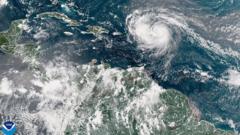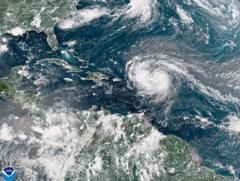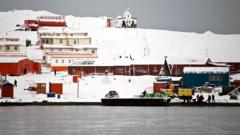Recent research reveals that small animals, known as zooplankton, play a significant role in combating climate change through their unique migration patterns. These creatures, often overlooked compared to more prominent Antarctic species, have the ability to sequester large amounts of carbon, effectively countering greenhouse gas emissions equivalent to the yearly output of approximately 55 million petrol vehicles.
**Tiny Zooplankton: Unsung Heroes in the Fight Against Climate Change**

**Tiny Zooplankton: Unsung Heroes in the Fight Against Climate Change**
Discover how tiny ocean creatures are impacting global warming while facing growing threats.
Zooplankton, particularly the copepod, are gaining attention for their critical role in carbon cycling within the Southern Ocean. In spring, they consume energy-rich phytoplankton at the ocean's surface, accumulating fat stores that are later metabolized when they migrate to depths of around 500m to 2km. This migration not only aids in their survival during harsh winters but is crucial for carbon sequestration.
The carbon-rich waste they produce settles deep within the ocean, keeping carbon dioxide locked away for decades or even centuries, delaying its contribution to atmospheric warming. Researchers have quantified this process, realizing that zooplankton are responsible for transferring an impressive 65 million tonnes of carbon annually to depth, substantially aiding in climate regulation.
Despite their critical contribution, zooplankton face emerging threats from climate change, commercial harvesting, and environmental disturbances that could diminish their populations and disrupt the vital biological pump they provide. Recent krill harvest data indicates a concerning trend, with significant portions of their environment already exploited by commercial interests.
Scientists emphasize that the findings should inform climate change models and foster awareness of these tiny yet mighty creatures. Enhancing our understanding of zooplankton is essential, as their health directly correlates to the ocean's ability to mitigate climate impacts. The urgency to protect these unsung heroes of the ocean is echoed by researchers, suggesting that safeguarding their habitats is an integral step toward combating global warming.
As we delve deeper into the interconnectedness of ocean life and Earth's climate, it becomes clear that every creature, no matter how small, plays a pivotal role in the well-being of our planet's environment. This new research, published in "Limnology and Oceanography," is a call to action to recognize and preserve the ecosystem balance that zooplankton help maintain.
The carbon-rich waste they produce settles deep within the ocean, keeping carbon dioxide locked away for decades or even centuries, delaying its contribution to atmospheric warming. Researchers have quantified this process, realizing that zooplankton are responsible for transferring an impressive 65 million tonnes of carbon annually to depth, substantially aiding in climate regulation.
Despite their critical contribution, zooplankton face emerging threats from climate change, commercial harvesting, and environmental disturbances that could diminish their populations and disrupt the vital biological pump they provide. Recent krill harvest data indicates a concerning trend, with significant portions of their environment already exploited by commercial interests.
Scientists emphasize that the findings should inform climate change models and foster awareness of these tiny yet mighty creatures. Enhancing our understanding of zooplankton is essential, as their health directly correlates to the ocean's ability to mitigate climate impacts. The urgency to protect these unsung heroes of the ocean is echoed by researchers, suggesting that safeguarding their habitats is an integral step toward combating global warming.
As we delve deeper into the interconnectedness of ocean life and Earth's climate, it becomes clear that every creature, no matter how small, plays a pivotal role in the well-being of our planet's environment. This new research, published in "Limnology and Oceanography," is a call to action to recognize and preserve the ecosystem balance that zooplankton help maintain.



















